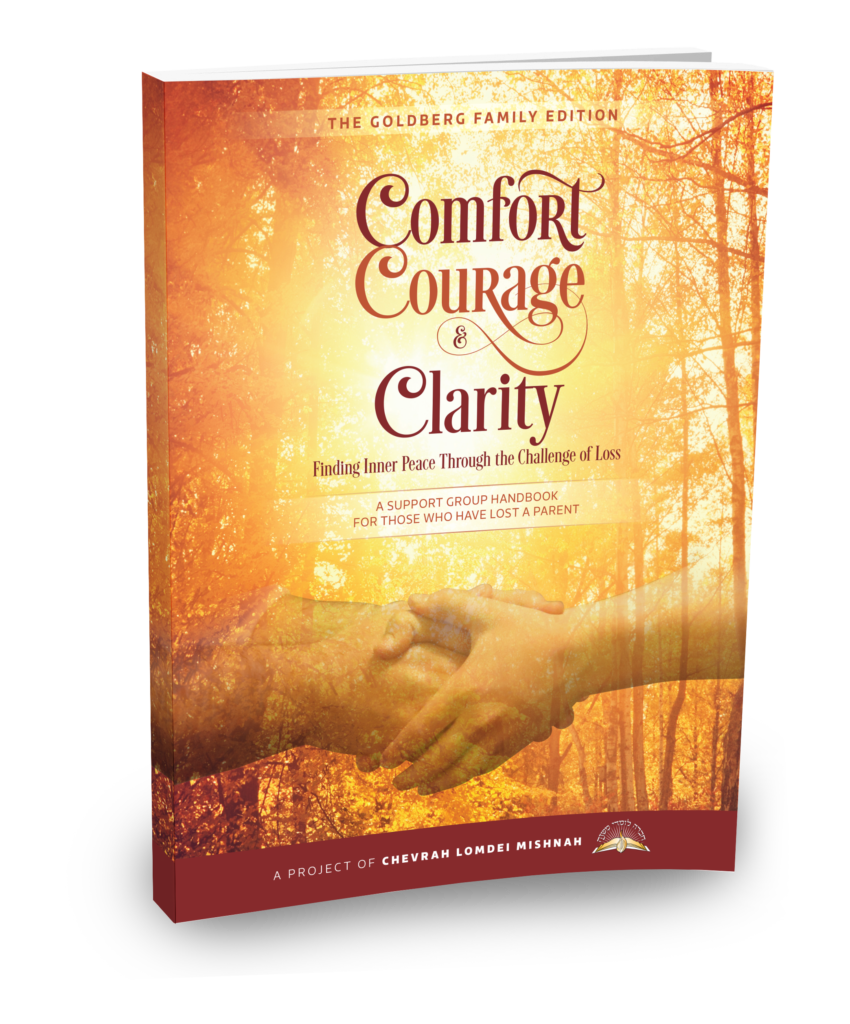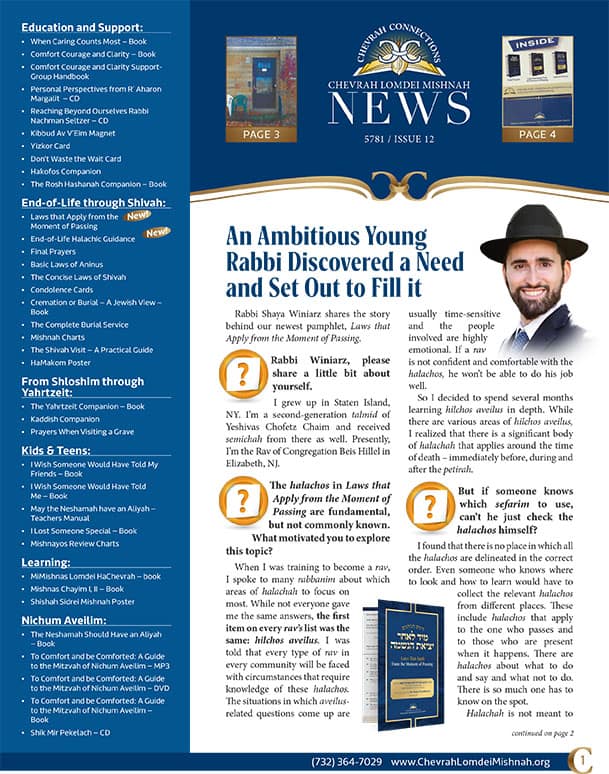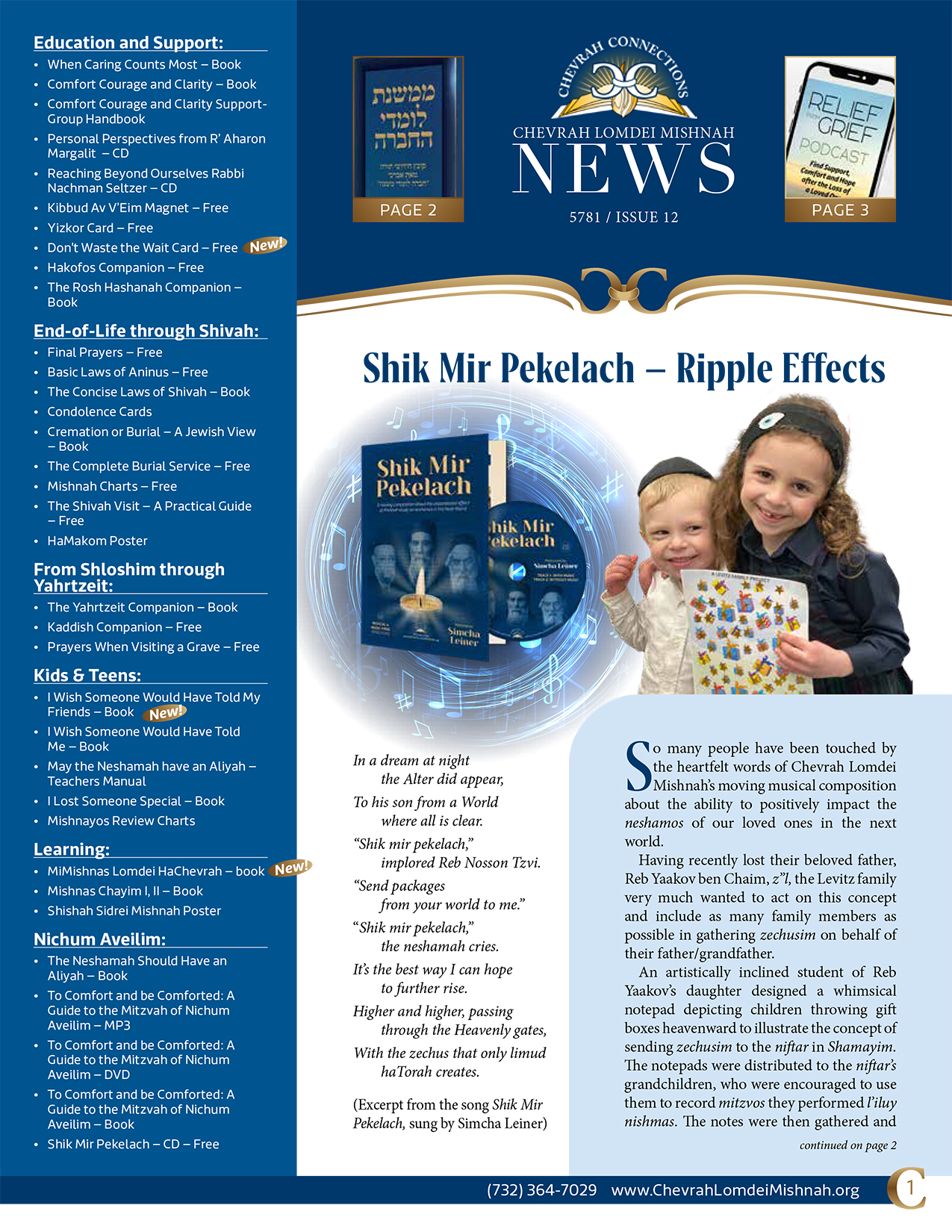Binah
Everything was so completely ordinary—until it wasn’t. The before and the after. Although there was also a nice amount of during as well—in between the before and the after.
Sound confounding? That’s because it is. It is so confounding that those who know Miriam’s family are still trying to make sense of it—although they know they never will; not in this world.
Self-described “ordinary” Miriam Shoenig Ribiat grew up in an “ordinary” family in an “ordinary” town. Life was just that: blessedly ordinary.
Until Miriam came home from seminary in Eretz Yisrael. That was the year ordinary stopped; her younger brother—the baby of the family and the beloved ben yachid—was niftar from leukemia shortly after his bar mitzvah.
Just a few years later, Miriam’s life spiraled into this-doesn’t-really-happen-in-real-life mode. She was a busy, young mother of four when she learned that both her mother and her sister were diagnosed with cancer—in the very same week. Her mother had a good prognosis; her sister Esty, less so. The doctor gave her five years at most.
“My mother was young,” says Miriam. “She was vibrant and strong.” So strong that no matter where the cancer showed up, she refused to let it stop her. She continued living her life, treatment and all, and in fact, kept her illness private to the extent that for years people didn’t know.
“Esty did not have as good a prognosis, but she had that same will to survive. She went to work, continued with her extracurricular activities and even got married. Throughout the five years of their illnesses, the rest of our family watched as they steadily deteriorated but simultaneously refused to give up.”
That made the shock all the more acute when one night—in the middle of dancing at his nephew’s wedding — Miriam’s father, a young, healthy man, had a massive heart attack and was niftar that very night. It was so completely unexpected; the family was utterly blindsided.
“During my father’s shivah I kept looking at my sister, who was so, so sick. And I thought, Hashem won’t take her also. Somehow she will get better. We’d had our share of nisyonos already—I was sure that now it would end. It had to, right? After all, nobody goes through this much tragedy.”
And yet…
“Eight months later I attended Esty’s levayah, and a year and a half after that, I was back in my hometown for my mother’s levayah.”
Goodbye ordinary, hello surreal.
******
It’s been a long journey since then. Healing does not happen in a vacuum. And it may not ever be complete; one might regain the ability to function normally after tragedy, but life is forever altered. A simchah will still invoke feelings of loneliness and pain; Yom Tov still brings with it feelings of longing.
After her mother’s petirah, which coincided with the start of a new school year, Miriam tried her hardest to get a hold of herself and move forward. She desperately wanted to regain a semblance of normalcy and tried mightily to go through the motions of life.
But life doesn’t work that way, Miriam recognizes now. “I think that without realizing it, I was going down a road of victimization. I was in so much pain, I had experienced so much tragedy. I missed my mother so much after her petirah. I used to speak to her about everything, and I needed her. I missed my sister, who I had shared so much with; I missed my father—his love, and the chizuk he gave me.”
But one day a friend challenged her. She said, “You know, Miriam, you never really accepted what happened.”
Miriam wasn’t quite sure what that meant. Here she was, a frum young woman, a Bais Yaakov graduate; of course she trusted Hashem. She thought she had accepted what He was handing her. What did real acceptance actually mean? It was time to start learning some new tools.
One thing was clear: Something had to change. But there were so many things to work on, it was overwhelming.
“For example,” shares Miriam, “one area that I had to work through was realizing that I was putting my pain on a sort of pedestal; no one had gone through the type of tragedy I went through. I was the master of painful situations. How could anyone even understand me? But I learned that what I was doing was keeping people away. Instead of letting them share my pain and be there for me, I either brushed off their overtures or made sarcastic comments as a protection for myself. But the more I rejected others, the more alone I felt.”
The real avodah, admits Miriam, was working on her relationship and connection with Hashem. As she was going through these nisyonos, she felt most calm when she took control of situations. Logistics, technicalities, anything she was able to control, she did, or at the very least tried to.
But she still had to learn that when things didn’t turn out the way she hoped they would, it wasn’t because she hadn’t tried hard enough, or that she could have done anything differently (Why didn’t we try to see that doctor sooner? Why didn’t I realize Mommy needed more painkillers—I could have made her suffer less…) but because Hashem willed it that way. Learning to share her feelings with Hashem, really expressing them, made her feel closer to Him.
It is a slow, ongoing process, and the year following her mother’s petirah, Miriam didn’t go back to work. She spent the next year and a half focusing on herself — her pain, her family, rebuilding her future.
When she was ready to go back to work, Miriam took a job at Chevrah Lomdei Mishnah, a multifaceted organization, which provides the service of learning mishnayos and Gemara l’ilui neshamas a loved one on yahrtzeits, shloshim, and the like.
In her capacity as project manager, Miriam was asked to begin writing articles for the organization’s website. In her articles, she described many of the feelings and issues which affect grieving adults in various situations: simchos, Yamim Tovim, saying Yizkor, new babies, and more. As the number of articles grew, someone had the idea of collating them into a support handbook.
From a few personal, heartfelt articles, a magnificent, 112-page handbook was born. In it, Miriam and her co-collaborator, Mrs. Ruchy Rosenfeld, address the enormously wide range of thoughts and feelings felt by those who have lost loved ones.
Miriam’s writing was deeply personal. She wrote about how badly she missed her parents on a constant basis, feeling the lack of their input and advice in her daily life; how she felt that she was too young to have gone through so much; how and why going to shul for Yizkor was too excruciating for her.
“On the one hand, I wasn’t sure I really wanted to expose myself to the public and be so vulnerable. On the other hand, I’d always felt that writing down my feelings was therapeutic for me, and I appreciated the comments I received when someone read one of my articles. All in all, creating this handbook to help others heal ended up being so beneficial for my own healing.”
Through her work, Miriam has had the opportunity, on a regular basis, to help and reach out to others who have been affected by loss as she was, and this has brought her both comfort and chizuk.
“I gained so much through working on this project,” Miriam says. The pain is still there; it will never really go away. Even now, I feel the need to speak to my parents about a concern that I have with one of my kids that is weighing heavily on me. When I need financial advice or have a chinuch question, I can’t get used to the fact that I can’t pick up a phone and call my parents.”
Yet Miriam does finally see a sliver of light peeking through. She knows she will never have any answers in this world, but by banding together with those who seek comfort and can also comfort, there is a way to face the future.
____________________________________________________________________________________
Miriam’s support handbook, Comfort, Courage, & Clarity © Chevrah Lomdei Mishnah, is available to the public. Miriam Ribiat can be contacted through Binah.
******
Miriam explains that there is no one-size-fits-all, neither to the grieving process nor to comforting others. Each situation is as unique as the individual.
“What would be a trigger for one person might not be noticed by another; one person finds comfort in naming a baby after a parent, while another finds it too raw and painful. What gives one person strength is not necessarily right for someone else.”
One example she gives is how she herself operated in the first few months after her mother’s petirah. “People told me I was strong, but I didn’t understand what that actually meant. I had responsibilities. I had a job and a family. I wasn’t going to break down in middle of my grocery shopping!
“But as the year wore on, I saw that I wasn’t me anymore. I wasn’t the mother or wife or teacher I wanted to be. I was detached, and found it very difficult to be there for anyone emotionally. And I was always too tired or too busy to really pay attention to my children.”
It took her some time to learn that this plugging forward wasn’t called strength. In a sense, it may have even been a weakness, as it was easier not to give in to the feelings of mourning and grief.
“For me, strength was to actually allow myself to fall apart! To have time to cry, to mourn. I had been through three major losses in a very short period of time, and missed all three people so, so much. When my daughter said something cute, and I couldn’t share it with my mother, I needed to take the time to feel the loss and cry. When I had a question for my father or needed a sisterly schmooze, I had to sit down and cry out the pain.
“I also learned that strength doesn’t mean you have to handle things alone. It’s true, maybe no one can understand your exact situation, but they can still be present for you and show they care in the way they know how. I can still speak to a friend and ask her to just listen to my pain. She can feel for me even if she never experienced it.
Sometimes strength means allowing for vulnerability—which is difficult for anyone. But if I was having a hard week even a year after my mother died, it was okay to accept outside help, whether that meant more cleaning help or my sister-in-law’s offer to make supper.”
The Gift of Hope
I was recently talking to a few friends, and the conversation turned to the word hope and its definition. I realized that for me, the definition of hope is recognizing that regardless of what comes my way, I can be okay. I might have to work through the emotions of sadness, anger fear… but at the end I can be okay.
A few weeks before my mother died, she called me up. She had just gotten off the phone from the doctor. He had said to her, “I will do my best, but the cancer has spread all over. I don’t think there is much I can do.” She was scared and she was devastated. She really didn’t want to die. I was left holding the phone, wondering how I was supposed to know what to say to my mother who was young, who wanted to live, but had just been given a death sentence.
I answered something that was probably not so appropriate, but I had nothing better to say. “Ma,” I said, “you have three up there and three down here. Why are you so afraid to die?”
“I am not so afraid to die,” she answered. “I just feel so bad for the three of you down here.” In her fear and her pain she was focusing on the three of us down here, still in this world, and her concern for us. She knew that we would be devastated by her passing and that continuing onward would be a painful journey for us.
Today I wish I could continue that conversation with her. I would tell her that yes, her absence and my father’s absence have left a terrible void in me. I feel bereft and lonely. I feel as if I am left without guidance. I miss them on a daily basis, and even more so when there is a simchah or a yom tov. I long to tell her how much she and my father have given me. At the same time, they haven’t left us with nothing. It is from them that I learned that we can go on, even with pain. We can feel joyful despite the pain that might well up without warning. They left us with the gift of carrying on. They left us with the gift of hope.
Mrs. Miriam Ribiat, Excerpted from Comfort, Courage, & Clarity Handbook © Chevrah Lomdei Mishnah
Miriam says that guilt plays a huge part when losing a loved one. “People struggle with guilt on so many levels. At times, we feel we didn’t do enough. Even if we know that we did a plenty, we might start to think how we could have done things differently.
“I had to work through a lot of guilt. Eventually I realized that feeling guilty was a way of feeling in control, as if it were up to me to have made things happen differently and I didn’t.”
Guilt is a very real emotion in our daily lives, even without any connection to tragedy. There is always what to feel guilty about, says Miriam, whether it is mishandling a situation with a child, or not putting in enough hours at work.
“I learned that when we feel guilt we must recognize it, try to do things differently or better in our lives right now, and then move on. We need to realize that the ultimate outcome of a situation is going to be what Hashem wills.
“We can’t obsess over what we could have done differently; we can only try to do our best in the future. Dwelling on it any more than that is the yetzer hara trying to pull us down.”
DON’T GO IT ALONE
Miriam had a hard time accepting platitudes from people who meant well. She recognizes that people want to give chizuk, but often the person who is grieving is not ready or able to hear it, and sometimes people say things that aren’t necessarily true.
“At my father’s shiva, I kept hearing over and over again was how lucky I was to have such warm memories. Each time I heard these words I wanted to scream, don’t you know that my father is too young to be a memory? I didn’t want the memories – I wanted him!
People told Miriam that her parents would be meilitz yosher, or they’d say, “Talk to them… they hear you.” Really? She wanted to ask them. How do you know all that? Did you die and come back to this world?
Miriam had to speak to the right people. A Rav can be a tremendous talmid chacham, she says, but he might not necessarily be familiar with these inyanim. In the end, Miriam found people who helped her learn to differentiate between what is emes and what are “accepted” things to say.
– August 2017
Comfort, Courage and Clarity is an innovative guide that includes the format and materials for effectively running a support group for those who have lost a parent.














